Police treat Derry bonfire material as hate crimes
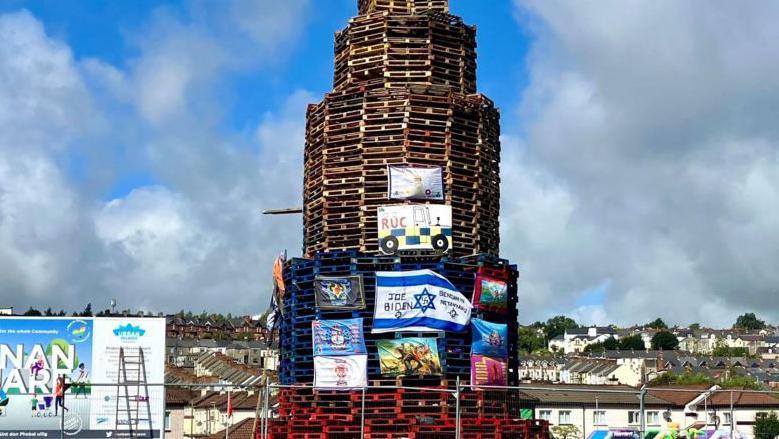
Items on the bonfire included union flags, a King Charles coronation flag and the flag of Israel
- Published
Police are treating the display of flags and banners on a bonfire in Londonderry’s Bogside as a hate crime.
The bonfire at Meenan Square, which displayed union flags and Israel flags, was lit on Thursday night.
Politicians in the city have condemned the burning of flags and emblems.
Democratic Unionist Party (DUP) MLA Gary Middleton said it “shouldn’t be tolerated in a normal society” while Sinn Féin MLA Pádraig Delargy said it was “unacceptable and disrespectful”.
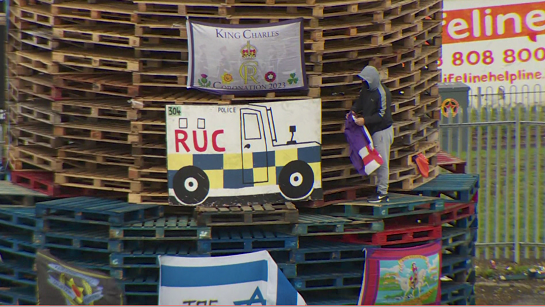
Politicians have condemned the placing of flags and emblems on the bonfire
On Thursday morning, a number of banners, flags and placards were placed on the Bogside fire including union flags, a King Charles coronation flag and the flag of Israel.
The names of US President Joe Biden and Israeli Prime Minister Benjamin Netanyahu were written on that flag next to a swastika and crosshair.
It was one of a number of bonfires held in the city on Thursday.
The Police Service of Northern Ireland (PSNI) said it was investigating material placed on bonfires in Derry and was treating them as hate crimes.
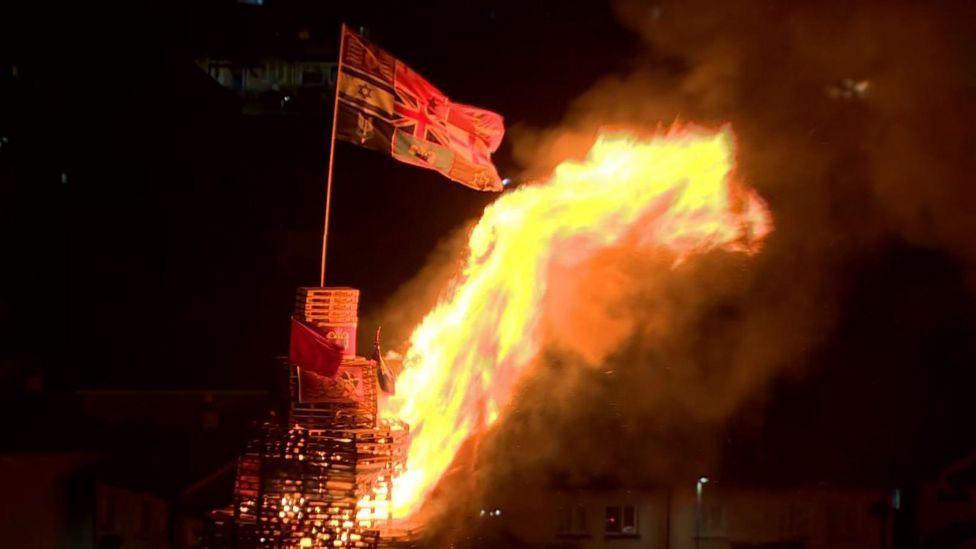
The bonfire was lit on Thursday evening
Speaking to BBC News NI, Mr Middleton said efforts needed to be made to move away from burning flags and emblems.
“It happens on all sides,” he said.
“The type of bonfires that burn emblems or flags and try and taunt the other side of the community – that doesn’t further anybody’s culture and certainly isn’t something that should be celebrated.
"We need to get away from the days where the burning of flags and emblems is acceptable."
Mr Delargy said the burning of contentious material was “in stark contrast to the positive work that is being done in the community to showcase everything that is good about Derry and its people”.
“Once again, we have seen the burning of flags on bonfires – this is unacceptable, disrespectful and there is no place for these displays anywhere in our society," he said.
He said hundreds of people had attended “positive community events” across the city in recent days including the Féile Derry community festival.
“That is the image of the Bogside that should be projected around the world, because we have much to celebrate, and to build on in the future,” he said.
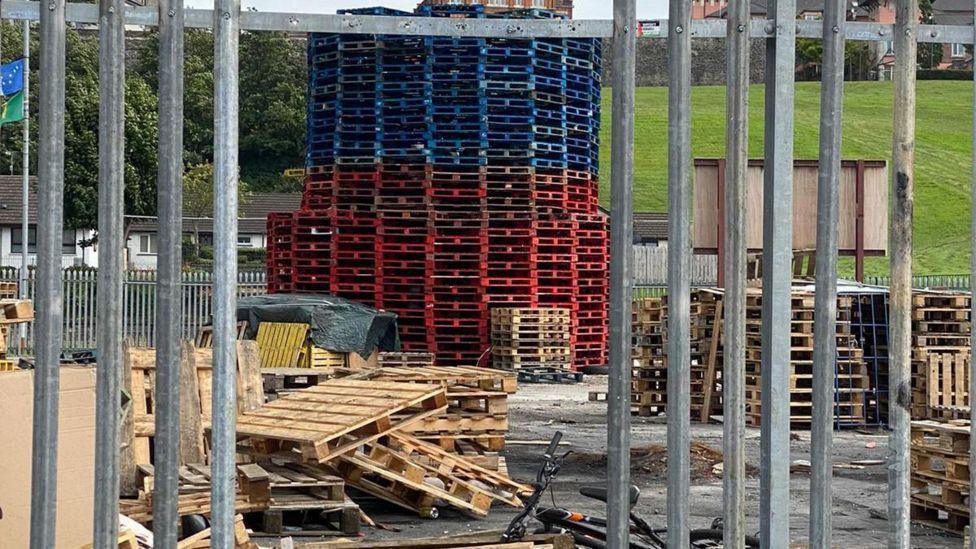
Owners of the Meenan Square site, where the bonfire was built, say they could not find a contractor to clear the area
On Thursday, Bishop of Derry the Right Reverend Donal McKeown had appealed for calm ahead of the bonfire.
That call came after the owner of the private land - Apex Housing Association - in Meenan Square, where the bonfire was built, said it could not find a contractor willing to clear the site.
The Northern Ireland Fire and Rescue Service said it was not called out to any bonfire-related incidents in Derry on Thursday night.
'Normalised'
Previous bonfires in Meenan Square have attracted some criticism in recent years.
The police investigated shots being fired near the site in 2022 and also investigated reports of political material - including flags and poppy wreaths - being placed on the bonfire as potential hate crimes.
Posters placed on the bonfire in 2021 referenced former PSNI Chief Constable Simon Byrne and one referred to the murder of Catholic police officer Ronan Kerr.
Mr Kerr was killed when dissident republicans fitted a booby-trapped bomb to his car in Omagh, County Tyrone, in 2011.
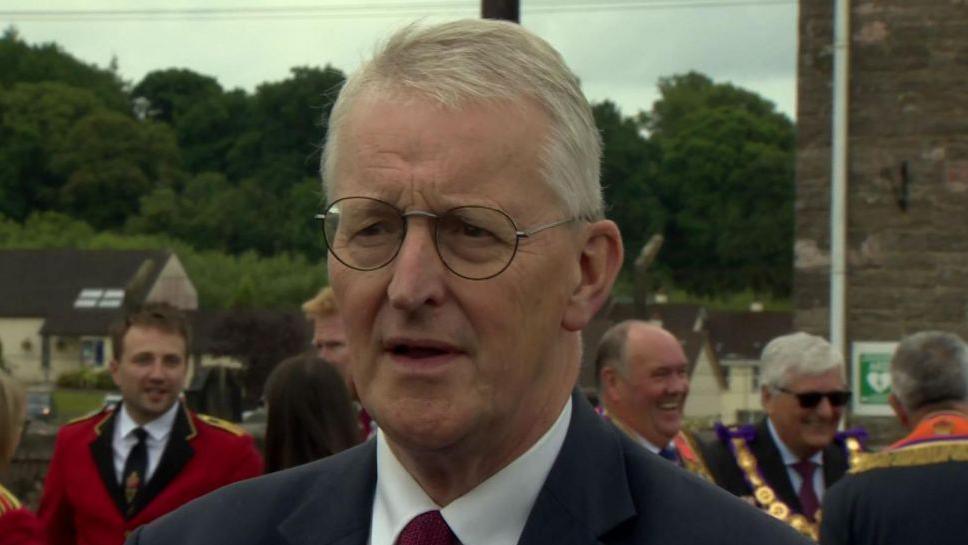
Last month Hilary Benn condemned sectarian signs and effigies on Eleventh night bonfires
Why are bonfires lit in Northern Ireland?
Bonfires on 15 August are traditional in some nationalist parts of Northern Ireland to mark the Catholic Feast of the Assumption.
Some bonfires are also lit in August to commemorate the introduction of internment without trial of republican suspects during the Troubles, which was introduced by the UK Government in 1971.
In July, Northern Ireland Secretary Hilary Benn condemned sectarian signs and effigies on Eleventh night bonfires.
Hundreds of bonfires are lit every year in unionist communities across Northern Ireland on the eve of the Twelfth of July, the main date in the annual parading season.
The date commemorates the Battle of the Boyne in 1690 when the Protestant King William III - also known as King Billy and William of Orange - defeated Catholic King James II.
A sign apparently threatening Social Democratic and Labour Party (SDLP) leader Colum Eastwood was placed alongside a hanging effigy on a bonfire in the Rathcoole area of Newtownabbey.
Images of First Minister Michelle O'Neill and SDLP MP Claire Hanna were also placed on a bonfire.
At that time, Mr Eastwood said it was saddening that such displays had become “normalised” and happen annually.